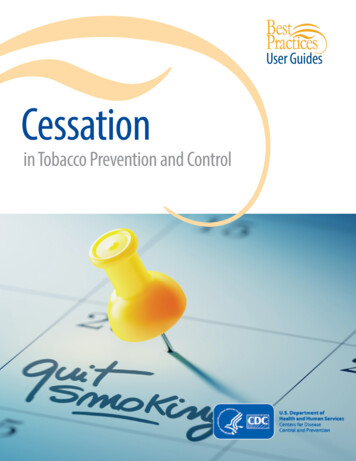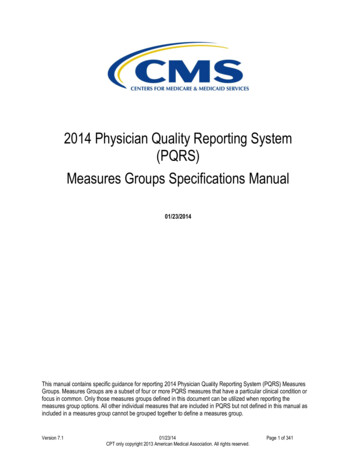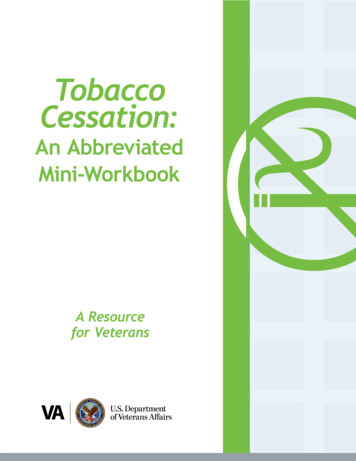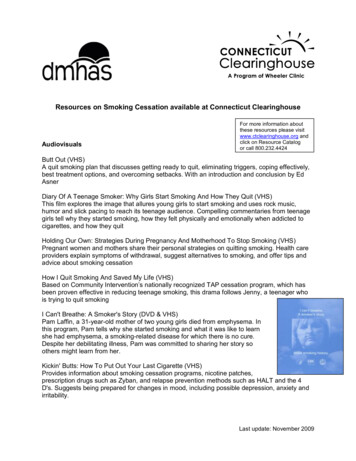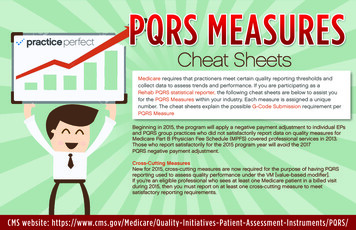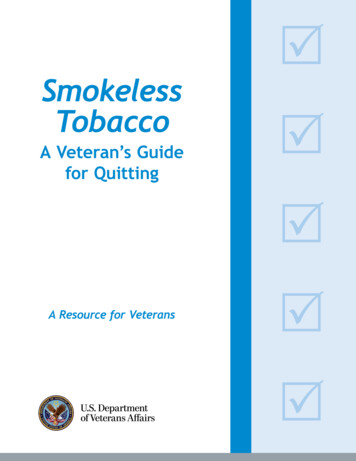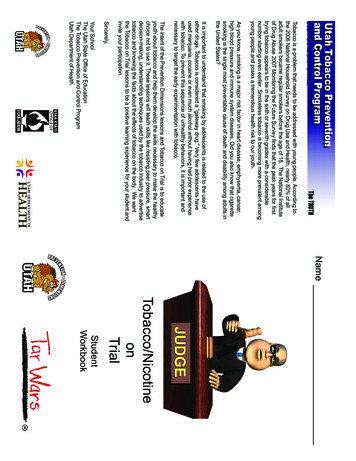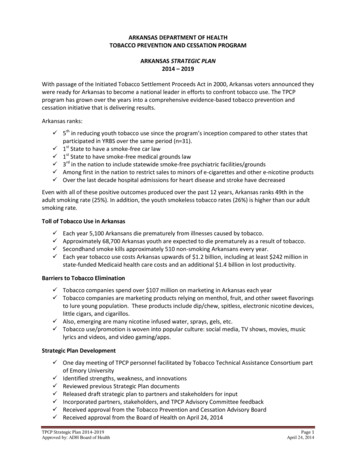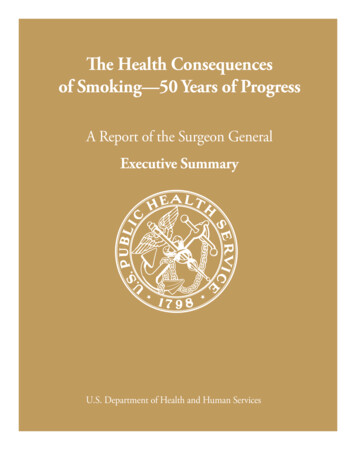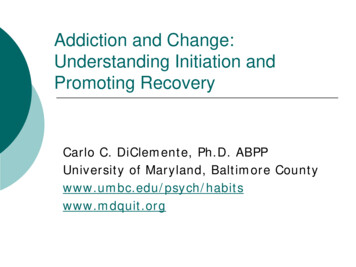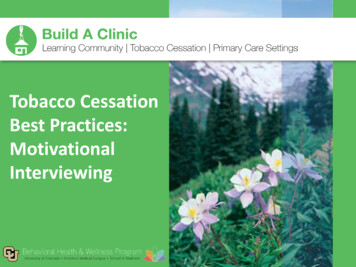
Transcription
Tobacco CessationBest Practices:MotivationalInterviewing
HousekeepingPleasedo thefollowingTurn off ormute yourcomputerspeakers.*If you close out of the webinar,reconnect through the webinaremail.Technical Difficulties? Call Sara Mumby at 303.724.6327*Audio for the webinar today will be through your computer speakers only. 2016 BHWP
Cindy Morris, PsyDClinical Director, BHWPJim Pavlik, MAProgram & Policy Analyst 2016 BHWP
Training Series1. Tobacco Cessation Counseling Best Practices: AnIntroduction2. Tobacco Cessation Best Practices:Pharmacotherapy3. Tobacco Cessation Best Practices: MotivationalInterviewing4. Analyzing and Adapting Clinical Workflow5. Special Populations and Cultural Sensitivity6. Tobacco Clinic Scalability and Sustainability 2016 BHWP
Module 3: Objectives Explore ways to enhance behavior change byusing the Motivational Interviewing approach Learn motivational strategies to enhancemotivation and encourage commitment tochange 2016 BHWP
Evidence-Based Tobacco Cessation“Counseling and medication areeffective when used by themselvesfor treating tobacco dependence.The combination of counseling andmedication, however, is moreeffective than either alone.”The U.S. Department of Health & Human Services - Public Health Service Clinical Guideline: Treating Tobacco Use andDependence - 2008 Update 2016 BHWP
Tobacco Dependence Has Two PartsTobacco dependence is a 2-part problemPhysicalBehaviorThe addiction to nicotineThe habit of using tobaccoTreatmentTreatmentMedications for cessationBehavior change programTreatment should address both the addictionand the habit.Courtesy of the University of California, San Francisco 2016 BHWP
Tobacco Cessation BestPractices: MotivationalInterviewing
Motivational InterviewingDefinition:Motivational interviewing is acollaborative conversation style forstrengthening a person’s ownmotivation and commitment tochange. It’s a way of being versus away of doing. 2016 BHWP
The Key to MIAdopt the right “heart-set.” This includes:PartnershipActive us on well-beingEvocationStrengths and resources 2016 BHWP
Primary Goal of MIInteract with a person in a way that increasesmotivation to change and evokes change talkWhat is Change Talk?A person’s own statement that favors change 2016 BHWP
5A’s and Stages of Change5A’sAskAdviseAssessAssistArrangeStage of onMaintenanceMISet SMART GoalsCreate Action Plan 2016 BHWP
Four Processes in MIPlanningEvokingFocusingEngaging 2016 BHWP
Four Processes in MI: EngagingThe process of positive engagement involves:① Establishing a trusting and mutually respectfulworking relationship② Agreement on treatment goals③ Collaboration on ways to achieve these goalsEngaging 2016 BHWP
Collaboration 2016 BHWP
Four Processes in MI: FocusingFocusing in MI is an ongoing process of seekingand maintaining directionFocusing 2016 BHWP
Guiding 2016 BHWP
Four Processes in MI: EvokingEvoking is the process of eliciting aperson’s own motivation for change byresolving ambivalence to changeEvoking 2016 BHWP
Motivation 2016 BHWP
Four Processes in MI: PlanningPlanning involves commitment to change andthe formulation of a concrete change planPlanning 2016 BHWP
Commitment 2016 BHWP
MI Skills & Strategies
OARSOOpen questionsA AffirmingR ReflectingS Summarizing 2016 BHWP
Open-Ended Questions Difficult to answer with brief replies or simple“yes” or “no” answers Allow for a fuller, richer discussion Conversational door-openers that encouragepeople to talk, using their own words Keeps the conversation focused on theindividual 2016 BHWP
Closed Questions① Do you want to quit smoking?Try instead: How do you feel about quitting smoking?What do you need to change to make this anopen-ended question? 2016 BHWP
Closed Questions② You do know that smoking is bad for youand your child don’t you?Try instead: What do you know about the health effectsof smoking on you and your child?What do you need to change to make this anopen-ended question? 2016 BHWP
Affirmations Statements or gestures that recognize aperson’s strengths Lead in the direction of positive change Confidence-builders Must be genuine and congruent Should not be overused as a little goes a longway 2016 BHWP
AffirmationsTrudy smokes. She knows it isn’t good for her and istired of people, like her husband, reminding her of it.Over time, she has come to realize that her social habithas become a full-fledged addiction. At some point, sheknows she will stop, but just not yet. Indeed, with allthe other things happening in her life, this is the onething she does just for herself. She feels guilty about itand tries to hide it from her son and avoids the topicwith her husband. She knows he’s right when he bringsup his concerns, but it still makes her feel angry. 2016 BHWP
ReflectionsSimple ReflectionRepeat back a few words the patient has just spoken“You’re tired of being reminded that smoking isn’t good for you.”Complex ReflectionReflect back their words as well as the deeper meaningbehind them“You do a lot for other people and you want to do something totake care of yourself.” 2016 BHWP
ReflectionsReflections allow the person to: Voice thoughts or feelings they may nothave talked about before Feel understood Feel accepted without judgment Hear their thoughts and feelingsrestated 2016 BHWP
Reflection Statement“I’ve been saying forever that my smokingis just a habit, but I know I’m addicted andthat is something about myself that’s beenreally hard to accept.”What reflection statement could yourespond with? 2016 BHWP
SummarizingSummaries allow people to: Recall the conversationThink of new ideasTransition from one theme to anotherPlan their next stepsFeel more confident moving forward 2016 BHWP
Strategies for EvokingDARNDesireDo you want to change your tobacco use?AbilityWhat do you think you might be able tochange?ReasonsWhat would be the benefits of stoppingyour tobacco use?NeedHow important is it for you to stop yourtobacco use? 2016 BHWP
Strategies for Evoking 2016 BHWP
Strategies for EvokingQuerying extremesLooking backLooking forwardImagine you continue to smoke,what’s the worst that can happen?Do you remember what your body feltlike when you stopped smoking before?If you decide to stop smoking, whatdo you hope will be different?Exploring goals and valuesWhat matters the most to you in life? 2016 BHWP
Strategies for EvokingReviewing past successWhen, in your life, have you made up your mindto do something and succeeded in doing it?Personal strengths/supportsHypothetical changeWhat strengths do you have that canhelp you quit smoking?Suppose you did quit smoking and are looking backon it now what is most likely to have worked? 2016 BHWP
MI is a particular way of having aconversation about change so that it isthe client rather than the clinician whovoices the arguments for change. Miller & Rollnick (2013) 2016 BHWP
SummaryMI is a combination of:① An engaged understanding of theindividual’s internal frame ofreference② A clear focus on change③ Evoking an individual’s ownmotivations and ideas for change 2016 BHWP
Conversations for ChangeVideo SeriesFind it at:Bhwellness.orgResources Videos
Motivational InterviewingQ&A
Tobacco Cessation WorkflowFront Desk/ AdminFax ngabstinence andhealthy livingstrategiesCurrent orrecent tobaccouseUtilizeMotivationalInterventions toAddress Use*Onsitecessationgroup and/orindividualcounselingPeer services/PatientnavigatorBillingReviewscreening &tobacco useassessmentVerify screening form& complete tobaccouse assessmentScreening formPost/ placetobaccocessationpromotionalmaterials inwaiting areaPhysician (2A’s & R Model)Clinician/ Medical Assistant (5A’s Model)YesBriefcounseling*Visual Prompton Exam RoomDoorRxmeds**Follow upappointment setwithin 1 horizations& referrals* 5As algorithm** CessationmedicationsprotocolEnter interventions intoEHR and/or chart 2016 BHWP
BHWP s/ 2016 BHWP
2016 BUILD A CLINICNew Session Beginning this Fall! 2016 BHWP
ehavioral-health-networktobacco-cancer-control/ 2016 BHWP
An organization of providers dedicated to thepromotion of and increased access toevidence-based tobacco treatment for thetobacco user Listserv provides up-to-date discussion andexpert informationhttp://www.attud.org 2016 BHWP
Rocky Mountain Tobacco TreatmentSpecialist Certification (RMTTS-C) ProgramSAVE THE DATE:October 10-13, 2016in Denver, CO Interactive, 4-day course Graduates will leave withthe confidence and skills toeffectively treat tobaccodependence in anyhealthcare setting 2016 BHWP
Behavioral Health &Wellness ellness.orgBehavioral Health andWellness ProgramBHWP UCD
change. It's a way of . being. versus a way of . doing. Let's begin with a definition for MI. Motivational interviewing is a collaborative conversation style for strengthening a pers\൯n's own motivation and commitment to change. It is a patient-centered, guiding method to enhance intrinsic motivation by explor對ing and resolving .
